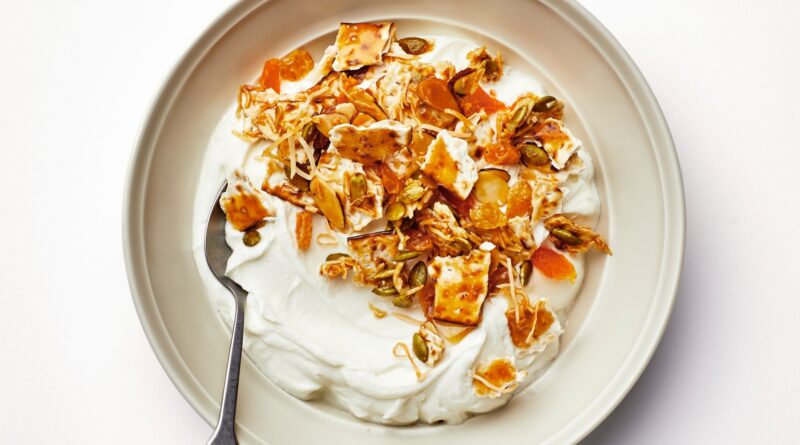Matzo Granola for Passover and Beyond
The only thing better than a good recipe? When something’s so easy that you don’t even need one. Welcome to It’s That Simple, a column where we talk you through the dishes and drinks we can make with our eyes closed.
Some of my oldest memories trace back to my grandmother’s kitchen, watching her and my mom make glistening, lacy-edged latkes for Hanukkah; bronzed loaves of challah soon to be greedily torn apart after a day of fasting for Yom Kippur; impossibly shreddy, twice-cooked brisket for Rosh Hashanah. But my favorite Jewish holiday meal may just be Passover—an unexpected choice, perhaps, because it’s the meal with the most restrictions when it comes to what you can and can’t eat.
For those unfamiliar, here’s the gist: Throughout the weeklong holiday, those observing can’t eat anything that falls into the category of chametz, or “leavened bread.” This basically means a ban on any grains, like wheat, barley, oats, spelt, and rye, that have come in contact with water for longer than 18 minutes and started to rise.
With that restriction comes the need for creativity, and that’s why I love Passover cooking. I’m endlessly fascinated by the ways Jewish home cooks have learned to approximate non-Passover-friendly foods, often using unleavened matzo in place of off-limits ingredients. There are no greater examples of this than the recipes that line the Jewish community cookbooks passed down on my mom’s side: crunchy mandelbrot made with matzo meal instead of flour, my grandma’s “stuffing” that subs matzo pieces for the typical bread cubes, and the Passover breakfast that comes second in my mind only to matzo brei, matzo granola.
The concept is simple: Instead of using oats, give crumbles of matzo the granola treatment, with nuts, dried fruit, and a syrupy coating that makes your kitchen smell of caramel as it bakes. Matzo granola duties most often fell to my aunt, who would show up to my grandparents’ house with a giant tub of the stuff to be eaten throughout our stay. Her recipe hails from a community cookbook put together by my grandparents’ synagogue, but over the years I’ve tweaked and tested until landing on my own version.
It’s a recipe that’s as easy as it is adaptable—a true choose your own adventure. Add orange zest, almond extract, or warm spices. Use up those half-empty containers of nuts and dried fruits. The only nonnegotiable? Make sure to bake enough to share.
Here’s how to make Matzo Granola:
Heat your oven to 325°. Crumble 4 matzos into small pieces—they don’t have to be even, just somewhere between the size of a dime and a quarter—then dump these onto a lined baking sheet. Add 1 cup chopped nuts or seeds (I like sliced almonds and pumpkin seeds). Bake for 10–15 minutes, stirring halfway through, until lightly toasted.
Meanwhile, in a small saucepan, combine ¼ cup each of honey, brown sugar, and a liquid fat (I like melted butter, but margarine and olive oil work too); bring to a simmer over medium-low heat, stirring occasionally. Once everything is melty and combined, remove from the heat and stir in a splash of vanilla extract and generous pinch of kosher salt.
Transfer the toasted matzo mixture to a large bowl and pour the honey mixture over top. Add ¾ cup unsweetened, shredded coconut. Stir until everything is nicely coated, then transfer the granola back to the same baking sheet. Pat it into an even layer. Reduce the oven to 300° and bake for 15–25 minutes, stirring halfway through, until deeply golden brown and your whole kitchen smells like caramel.
While the granola’s still hot, stir in ½ cup dried fruit (my go-tos are raisins and chopped apricots) and pat everything into an even layer again. Let the granola cool completely on the baking sheet, then break it up and transfer to an airtight container. Eat it with yogurt or milk—but if you’re like me, you’ll find yourself eating it by the handful, all by itself.

